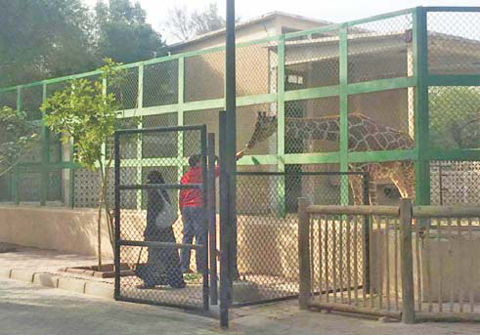 Zoos around the world prohibit visitors from feeding the animals lest they be harmed, yet this is roundly ignored in Kuwait. Despite signs and repeated efforts by zoo staff to warn visitors against feeding the animals, the practice continues. The animals at Kuwait’s zoo - especially after high visitor numbers on the weekends - can often become sick from eating too many snacks, chips, cookies, nuts and other items meant for human consumption.
Zoos around the world prohibit visitors from feeding the animals lest they be harmed, yet this is roundly ignored in Kuwait. Despite signs and repeated efforts by zoo staff to warn visitors against feeding the animals, the practice continues. The animals at Kuwait’s zoo - especially after high visitor numbers on the weekends - can often become sick from eating too many snacks, chips, cookies, nuts and other items meant for human consumption.
Parents will often feed animals themselves or let their children do so in the spirit of having fun. The harm to the zoo animals, however, is immeasurable. “We mean no harm. My son only wants to have fun and feed the monkeys - it’s not a big deal,” Egyptian visitor Abu Ahmad told Kuwait Times while his son was feeding the simians after jumping the fence. “The animals seem hungry. If they are feeding them, why do they eat again?” he argued.
Animals well cared for
Obaid Al-Azmi, a veterinarian at the zoo, told Kuwait Times that the zoo’s animals are healthy and feeding well, but the bad behavior of some visitors could make the animals’ health worse. “Every animal needs a different type of food. The food given at the zoo is special and similar to what animals feed on in the wild. Animals get all vaccinations and their nourishment is the top priority for our animal nutritionists. But visitors feed them chips, bread, peanuts and even plastic bags. Animals may also get infected with human diseases when visitors give them food. This can make them sick and even lead to their deaths,” cautioned Azmi.
Visitors behaving badly
Azmi said parents behave worse than their children, and do not care for the safety of the animals or their children. “An ostrich died recently because it swallowed some coins. A few years ago, I saw a man stub his cigarette on the giraffe’s tongue, while a child threw fireworks inside the monkeys’ cage. Parents even made their children ride on the turtle’s shell!” he recalled. Some people blame the vendors selling snacks at the zoo, but Azmi said that the peanuts, chips, and chocolates sold are supposed to be for human consumption and not for animals, because the zoohas clear signs warning against feeding the animals.
Sometimes, people bring in foods like bread or lettuce from outside. About controlling this behavior, Azmitold Kuwait Times that the zoo has many animals, so they cannot get security guards for every cage, especially on Fridays. Even if they did, parents always get angry and fight with the poor guards if they try to prevent their children from “having fun”.So the zoo management found that the best solution was to install more railings to prevent visitors from reaching the animals.
Nutrition vs accessibility
About animal nutrition, Azmi said: “Animals are not picky - they eat anything, but first we have to offer the food gradually. We had a problem with our leopard after visitors tried to feed it live rabbits, but it fled. These are zoo animals - they are not used to hunt their food.” He said artificial feeding can result in dietary vitamin and mineral deficiencies. “It can also lead to animals aggressively seeking out food from people, sometimes resulting in injuries, and can also cause diarrhea. Diarrhea is what we face every Friday after visiting hours,” he explained.
A few days ago, Azmi tried to save an elf goat, but it died. When an autopsy was conducted, plastic bags were found in its stomach. After their deaths, a Korean taxidermist embalms the animals, which are displayed at the visitor center of the zoo for educational purposes. Azmi took Kuwait Times on a tour inside the building where workers prepare the animals’ food, on which the zoo spends KD 144,000.
“We have an entire building for chopping and preparing food by nutrition specialists, using the finest meats, fresh vegetables and fruits. We have also room for grain storage,” he said. On a parting note, Azmi said visitors must remember two very important things.”Do not feed the animals - just have fun watching them. And do not tease them, because provoking them causes mental stress. Other behaviors by visitors like spitting and smoking can prove dangerous, as these acts adversely affect the health of the zoo animals,” he advised.
By FatenOmar









